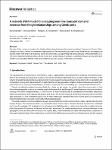Item Infomation
Full metadata record
| DC Field | Value | Language |
|---|---|---|
| dc.contributor.author | Hara, Giannika | - |
| dc.contributor.author | Christina, Milioti | - |
| dc.contributor.author | Panayotis G., Michaelides | - |
| dc.date.accessioned | 2023-05-23T02:37:41Z | - |
| dc.date.available | 2023-05-23T02:37:41Z | - |
| dc.date.issued | 2023 | - |
| dc.identifier.uri | https://link.springer.com/article/10.1007/s44257-023-00004-9 | - |
| dc.identifier.uri | https://dlib.phenikaa-uni.edu.vn/handle/PNK/8485 | - |
| dc.description | CC BY | vi |
| dc.description.abstract | The aim of this study is to analyze the freight relationships between three major mainland Greek ports (Piraeus, Thessaloniki and Volos), based on containers’ transportation. The methodology used is the Global Vector Autoregressive (GVAR) model. The empirical analysis is based on time series data spanning the period January 1998–December 2012. The most important finding is that a shock in one port doesn’t have, in general, a significant impact on any other port and the corresponding effects settle down relatively quickly, usually in less than two months. | vi |
| dc.language.iso | en | vi |
| dc.publisher | Springer | vi |
| dc.subject | GVAR | vi |
| dc.subject | Thessaloniki and Volos) | vi |
| dc.title | A network GVAR model for analyzing maritime transport demand: evidence from freight relationships among Greek ports | vi |
| dc.type | Book | vi |
| Appears in Collections | ||
| OER - Kinh tế và Quản lý | ||
Files in This Item:

